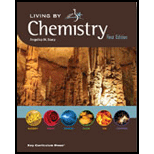
Concept explainers
(a)
Interpretation: The given temperature in Fahrenheit scale that is 95 oF needs to be converted into Kelvin scale.
Concept Introduction:
The Kelvin and degree Fahrenheit are scales of measuring temperature. The relation between two scales is as follows:
Here, K is Kelvin and oF is degree Fahrenheit.
(a)
Answer to Problem 9E
Explanation of Solution
The relation between two scales is as follows:
The given temperature is 95 oF. It can be converted into Kelvin as follows:
On solving,
Thus, the temperature 95 oF is equal to 308.15 K.
(b)
Interpretation: The given temperature in Fahrenheit scale that is 350 oF needs to be converted into Kelvin scale.
Concept Introduction:
The Kelvin and degree Fahrenheit are scales of measuring temperature. The relation between two scales is as follows:
Here, K is Kelvin and oF is degree Fahrenheit.
(b)
Answer to Problem 9E
Explanation of Solution
The relation between two scales is as follows:
The given temperature is 350 oF. It can be converted into Kelvin as follows:
On solving,
Thus, the temperature 350 oF is equal to 449.82 K.
(c)
Interpretation: The given temperature in Fahrenheit scale that is 5 oF needs to be converted into Kelvin scale.
Concept Introduction:
The Kelvin and degree Fahrenheit are scales of measuring temperature. The relation between two scales is as follows:
Here, K is Kelvin and oF is degree Fahrenheit.
(c)
Answer to Problem 9E
Explanation of Solution
The relation between two scales is as follows:
The given temperature is 5 oF. It can be converted into Kelvin as follows:
On solving
Thus, the temperature 5 oF is equal to 258.15 K.
Chapter U3 Solutions
Living By Chemistry: First Edition Textbook
Additional Science Textbook Solutions
Chemistry: The Central Science (14th Edition)
Chemistry (7th Edition)
CHEMISTRY-TEXT
Chemistry
Chemistry: An Introduction to General, Organic, and Biological Chemistry (12th Edition) - Standalone book
General Chemistry: Principles and Modern Applications (11th Edition)
 ChemistryChemistryISBN:9781305957404Author:Steven S. Zumdahl, Susan A. Zumdahl, Donald J. DeCostePublisher:Cengage Learning
ChemistryChemistryISBN:9781305957404Author:Steven S. Zumdahl, Susan A. Zumdahl, Donald J. DeCostePublisher:Cengage Learning ChemistryChemistryISBN:9781259911156Author:Raymond Chang Dr., Jason Overby ProfessorPublisher:McGraw-Hill Education
ChemistryChemistryISBN:9781259911156Author:Raymond Chang Dr., Jason Overby ProfessorPublisher:McGraw-Hill Education Principles of Instrumental AnalysisChemistryISBN:9781305577213Author:Douglas A. Skoog, F. James Holler, Stanley R. CrouchPublisher:Cengage Learning
Principles of Instrumental AnalysisChemistryISBN:9781305577213Author:Douglas A. Skoog, F. James Holler, Stanley R. CrouchPublisher:Cengage Learning Organic ChemistryChemistryISBN:9780078021558Author:Janice Gorzynski Smith Dr.Publisher:McGraw-Hill Education
Organic ChemistryChemistryISBN:9780078021558Author:Janice Gorzynski Smith Dr.Publisher:McGraw-Hill Education Chemistry: Principles and ReactionsChemistryISBN:9781305079373Author:William L. Masterton, Cecile N. HurleyPublisher:Cengage Learning
Chemistry: Principles and ReactionsChemistryISBN:9781305079373Author:William L. Masterton, Cecile N. HurleyPublisher:Cengage Learning Elementary Principles of Chemical Processes, Bind...ChemistryISBN:9781118431221Author:Richard M. Felder, Ronald W. Rousseau, Lisa G. BullardPublisher:WILEY
Elementary Principles of Chemical Processes, Bind...ChemistryISBN:9781118431221Author:Richard M. Felder, Ronald W. Rousseau, Lisa G. BullardPublisher:WILEY





